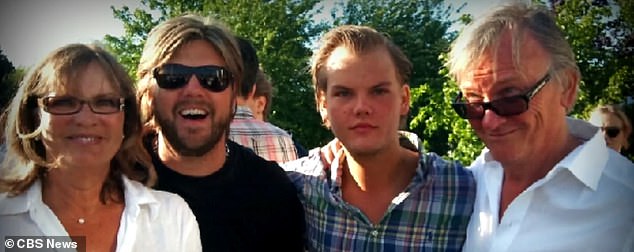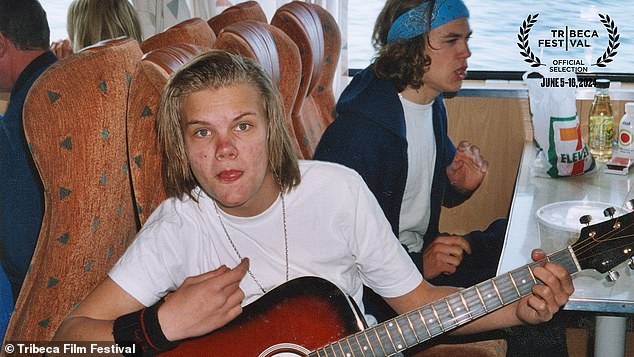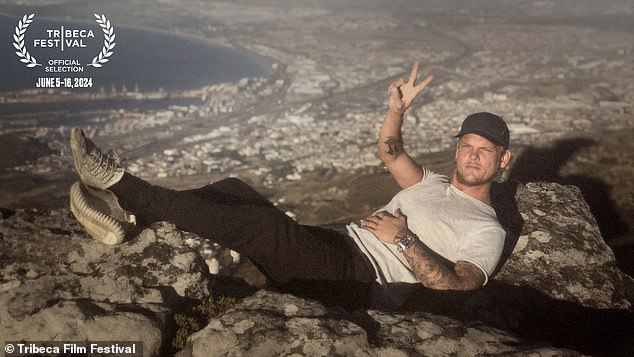Avicii’s father has revealed the heartbreaking comment the DJ made after his family staged an intervention in Ibiza and how he is still struggling with “survivor’s guilt” six years after his son’s death.
The Swedish musician, star of the new Netflix documentary Avicii: I’m Tim, tragically took his own life at the age of 28 in April 2018.
In his seven years in the limelight, the artist, whose real name was Tim Bergling, achieved several top 10 singles around the world and worked with world-famous artists such as Madonna, David Guetta, Lenny Kravitz and Coldplay.
Talking to him bbcAvicii’s father Klas recalled how the family intervened to try to prevent Tim from falling further into addiction to painkillers and alcohol in the summer of 2015.
By that time, he had achieved stratospheric commercial success with Hey Brother, which sold 2 million copies in the US, and Wake Me Up, which was the biggest-selling single in the UK in 2013.
However, Tim was struggling with his second album Stories, which had to be delayed several times amid his ongoing battle with addiction.
Reflecting on the intervention, Klas, who had previously said he felt he had “betrayed” his son by moving, added: “You are faced with your son, who has no idea what is going to happen.”
“You see he realizes something is planned behind his back.”
The late Swedish musician (pictured in 2014), star of the new Netflix documentary Avicii: I’m Tim, tragically took his own life at the age of 28 in April 2018.
Although the family had “no hesitation” about stepping in to help Tim, Klas acknowledged it had not been an easy decision.
The father recalled how the intervention lasted hours and, at the end, Tim made a heartbreaking confession.
He told his father: “I had decided hours ago but I just wanted to test you.”
Tim retired from touring in 2016 and had battled acute pancreatitis, having had his gallbladder and appendix removed in 2014.
Elsewhere in the interview, Klas admitted that he still struggles with “survivor’s guilt” and agonizes over what he did “wrong.”
However, the grieving father said several therapists have assured him that “many times nothing can be done.”
Before his death, Klas, his wife Anki and their three other children were confident that Tim’s mental state was “improving,” which only made the sudden loss even more devastating.
A year after the DJ’s death, Avicii’s family created the Tim Bergling Foundation, with Klas as director, to help other young people struggling with their mental health.

In the photo: Avicii with his parents Klas and Anki and his older brother Anton Korberg, whom Anki welcomed with a previous partner.

Avicii grew up in Stockholm, Sweden’s capital, and was so sheltered that he spent most of his first 19 years within a five-block radius.
After his death, his family said in an emotional statement: “Our beloved Tim was a seeker, a fragile artistic soul searching for answers to existential questions.”
‘I wanted to find a balance in life to be happy and be able to do what I loved most: music.
‘Tim wasn’t cut out for the corporate machine he found himself in; He was a sensitive guy who loved his fans but avoided the spotlight.
‘Tim, you will always be loved and sadly missed. The person you were and your music will keep your memory alive.’
Talking to him Sunday schedule In 2021, Klas Bergling said that his son was a “shy” and “introverted” man who struggled with his rapid rise to the spotlight.
He added that he had been “naive” to think that going to rehab would solve all of his son’s problems.
‘I’ve heard a thousand times that the fight starts when you’re sober. But I was very happy and you have to remember the happy moments too,” he said.
The DJ, who was their parents’ only child together but had half-siblings, was a quiet teenager who was very happy making music alone in his room.
After teaching himself to play guitar, Tim often skipped school to work on his music, making songs with software he hacked.

I Am Tim features Avicii himself giving a haunting account of an interview given at the end of his career.
When he rose to fame aged just 21 with Levels in 2011, Tim had to adapt to a DJ lifestyle spent playing in clubs, stadiums and festivals, which did not suit his reserved manner, his father said.
Since then, streaming giant Netflix has released two independent films that reflect Avicii’s personal struggles, as well as his versatile talents as a producer, songwriter and DJ.
Released simultaneously on Tuesday, the behind-the-scenes documentary I’m Tim and My Last Show, a recording of Avicii’s final concert at Ibiza’s Ushuaïa Beach Hotel, left fans of the tragic DJ in tears.
While My Last Show focuses on the DJ’s electrifying final performance, I’m Tim features Avicii himself giving a haunting account of an interview given at the end of his career.
He says he suffered from crippling anxiety and admits he was “killing himself” with his incessant touring.
Avicii’s dream was to not have to be “constantly hustling” and pushing himself to work harder and harder, but he couldn’t stop.
In a chilling moment, one of Avicii’s most famous collaborators says SOS, the first single from his posthumous album Tim, was a secret cry for help.
Aloe Blacc, who sang Avicii’s mega hit Wake Me Up, said it was a warning they heard “too late.”
The documentary, which received rapturous applause at Tribeca from a theater full of Avicii fans, features appearances by some of Avicii’s most famous collaborators, including disco legend Nile Rogers and Coldplay’s Chris Martin.
They reflect on the toll that touring took on Avicii, who became famous before he was 20 and performed more than 800 shows in six years, sometimes playing two cities in one night.


